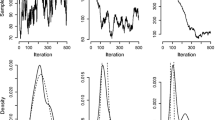Abstract
This paper aims to make three contributions to decision theory. First there is the hope that it will help to re-establish the legitimacy of the problem, pace various recent analyses provided by Maitzen and Wilson, Slezak and Priest. Second, after pointing out that analyses of the problem have generally relied upon evidence that is conditional on the taking of one particular option, this paper argues that certain assumptions implicit in those analyses are subtly flawed. As a third contribution, the piece aims to draw attention to an important similarity between Newcomb’s problem and the toxin puzzle. In short, both problems illustrate the fact that you can have a reason to intend to φ without having a reason to actually φ.
Similar content being viewed by others
References
Burgess S. (2004) Newcomb’s problem: An unqualified resolution. Synthese 138(2): 261–287
Eells E. (1982) Rational decision and causality. Cambridge University Press, Cambridge
Jeffrey R. C. (1990) The logic of decision (2nd ed.). University of Chicago Press, Chicago
Joyce J. M. (2002) Levi on causal decision theory and the possibility of predicting one’s own actions. Philosophical Studies 110(1): 69–102
Kavka G. (1983) The toxin puzzle. Analysis 43(1): 33–36
Levi I. (1997) The covenant of reason. Cambridge University Press, New York
Levi I. (2000) Review essay: The foundations of causal decision theory. Journal of Philosophy 97(7): 387–402
Lewis, D. (1986a). Causal decision theory. In D. Lewis (Ed.), Philosophical papers (Vol. II). New York: Oxford University Press.
Lewis, D. (1986b). Prisoners’ dilemma is a Newcomb Problem. In D. Lewis (Ed.), Philosophical papers (Vol. II). New York: Oxford University Press.
Maitzen S., Wilson G. (2003) Newcomb’s hidden regress. Theory and Decision 54(2): 51–162
Nozick R. (1969) Newcomb’s problem and two principles of choice. In: Rescher N. (ed) Essays in honor of Carl G. Hempel. D. Reidel, Dordrect
Nozick R. (1997) Socratic puzzles. Harvard University Press, Cambridge, MA
Priest G. (2000) Truth and contradiction. The Philosophical Quarterly 50(200): 305–319
Priest G. (2002) Rational dilemmas. Analysis 62(1): 11–16
Rabinowicz W. (2002) Does deliberation crowd out self-prediction?. Erkenntnis 57(1): 91–122
Resnik M. (1987) Choices: An introduction to decision theory. University of Minnesota Press, Minneapolis
Slezak P. (1998) Rational decision theory: The relevance of Newcomb’s paradox. In: Gernsbacher M.A., Derry S.J. (eds) Proceedings of 20th annual conference of the cognitive science society. Lawrence Erlbaum, Mahwah, NJ, pp 992–996
Slezak P. (2005) Newcomb’s problem as cognitive illusion. In: Bara B.G., Barsalou L., Bucciarelli M. (eds) Proceedings of the 27th annual conference of the cognitive science society. Lawrence Erlbaum, Mahwah, NJ, pp 2027–2032
Slezak P. (2006) Demons, deceivers and liars: Newcomb’s malin génie’. Theory and Decision 61(3): 277–303
Slezak, P. (Unpublished). Realizing Newcomb’s problem. This piece is referred to in published papers by Slezak and, at least in August 2010, was available from his website.
Author information
Authors and Affiliations
Corresponding author
Rights and permissions
About this article
Cite this article
Burgess, S. Newcomb’s problem and its conditional evidence: a common cause of confusion. Synthese 184, 319–339 (2012). https://doi.org/10.1007/s11229-010-9816-1
Received:
Accepted:
Published:
Issue Date:
DOI: https://doi.org/10.1007/s11229-010-9816-1




